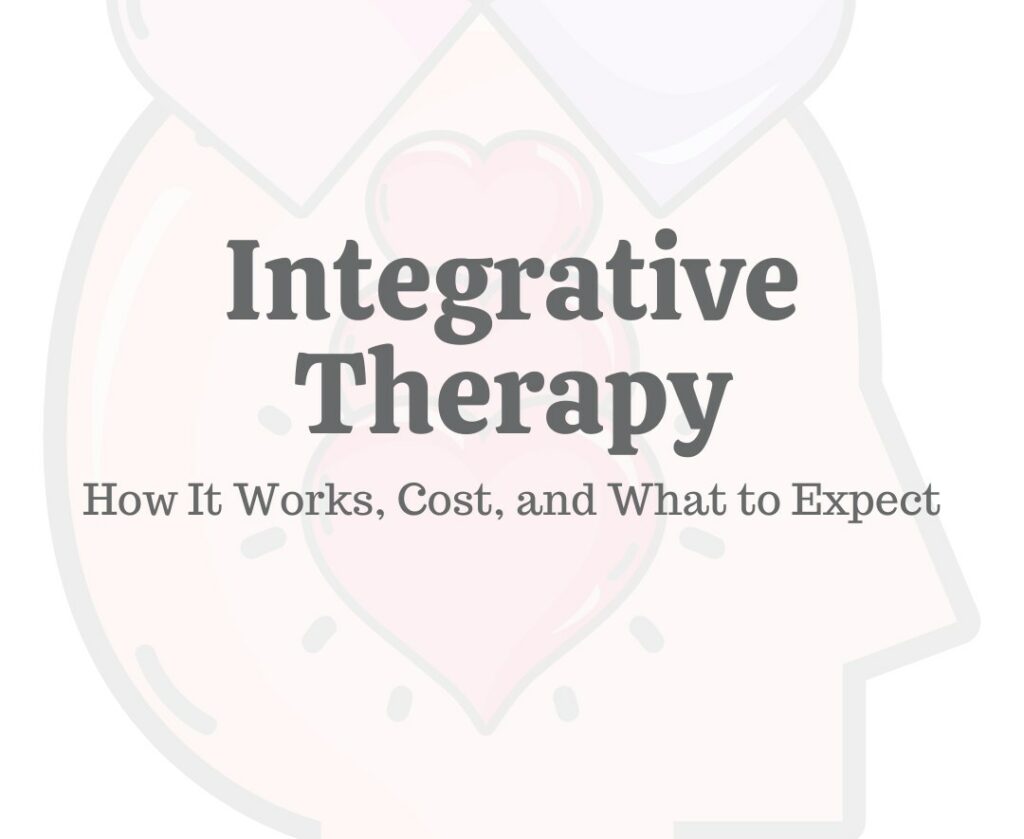If you’re looking for an effective treatment for your mental health issues, integrative psychotherapy may be the right choice for you. This approach combines different therapeutic techniques to address the unique needs of each individual. In this comprehensive guide, we will discuss the benefits of integrative psychotherapy and how it can help you or your loved one overcome a variety of challenges.
Contents
What Is Integrative Psychotherapy?
 Integrative psychotherapy is an approach to mental health treatment that combines different elements of various therapeutic approaches in order to provide a comprehensive and effective treatment plan for the individual. This type of therapy takes into account the whole person, including their physical, psychological, social, and spiritual needs.
Integrative psychotherapy is an approach to mental health treatment that combines different elements of various therapeutic approaches in order to provide a comprehensive and effective treatment plan for the individual. This type of therapy takes into account the whole person, including their physical, psychological, social, and spiritual needs.
Moreover, integrative psychotherapy is not restrictive or limited to any one particular approach or school of thought. Rather, it is an ever-evolving field that incorporates new theories and techniques as they are developed. This allows therapists to tailor their treatment plans to the unique needs of each individual client.
In fact, it is believed that this type of psychotherapy is useful for treating a wide range of mental health disorders, including anxiety, depression, trauma, and substance abuse. If you are considering integrative psychotherapy for yourself or a loved one, it is important to find a therapist who is experienced and trained in this type of treatment.
At the end of the day, integrative psychotherapy is about providing the best possible care for the individual. This type of treatment can be an extremely effective way to address mental health disorders and help people live happier healthier lives.
What Are Some Types?
There are several types of integrative psychotherapy, including:
Cognitive-behavioral therapy
CBT is widely used to treat a variety of mental health conditions, such as depression, anxiety, eating disorders, and substance abuse. It focuses on helping people identify and change negative thinking patterns and unhealthy behaviors. The aim of CBT is to provide people with the skills they need to manage their symptoms and live healthy, productive life.
Interpersonal therapy
Interpersonal therapy (IPT) is a type of short-term therapy that is typically used to treat depression. It is believed that this type of therapy work by helping people to understand and improve their relationships with others. IPT focuses on the here-and-now and emphasizes the importance of social support in recovery from depression.
Psychodynamic therapy
Psychodynamic therapy is a type of long-term, in-depth therapy that is used to treat a wide range of mental health conditions. It is based on the belief that our early experiences with our parents and other significant figures in our lives have a lasting impact on our thoughts, feelings, and behaviors. Psychodynamic therapy focuses on helping people to understand these unconscious processes and learn how they can be affecting their current life.
Dialectical behavioral therapy
DBT is a type of cognitive-behavioral therapy that is used to treat a variety of mental health conditions, such as borderline personality disorder, eating disorder, and substance abuse. It focuses on helping people to develop the skills they need to manage their emotions and cope with difficult situations in a healthy way. DBT also emphasizes the importance of mindfulness in treatment.
Gestalt therapy
 This type of integrative psychotherapy is based on the belief that we are best able to heal and grow when we are in contact with our emotions and aware of our present-moment experiences. Gestalt therapy focuses on helping people to become more aware of their thoughts, feelings, and behaviors in order to make positive changes. It works to create a safe and supportive environment in which people can explore their innermost thoughts and feelings.
This type of integrative psychotherapy is based on the belief that we are best able to heal and grow when we are in contact with our emotions and aware of our present-moment experiences. Gestalt therapy focuses on helping people to become more aware of their thoughts, feelings, and behaviors in order to make positive changes. It works to create a safe and supportive environment in which people can explore their innermost thoughts and feelings.
As you can see, there are several types of integrative psychotherapy available to help people with mental health conditions. Each type of therapy has its own unique focus and approach. If you are struggling with a mental health condition, it is important to speak with a mental health professional to determine which type of therapy would be best for you.
What Things It Can Help With?
Generally, integrative psychotherapy is believed to have overall beneficial effects. It can help with a variety of issues, including:
- Anxiety
- Depression
- Relationship problems
- Substance abuse
- Trauma and PTSD
- Grief and loss
Additionally, IP can also help people who are struggling with more than one issue at the same time. For example, someone might seek treatment for both depression and an alcohol use disorder. IP can also be beneficial for people who have ” plateaued” in their current therapy and are looking for a more comprehensive approach.
Moreover, this therapy is not only for people with mental health disorders or those who are experiencing significant distress. It can also help people who are struggling to cope with day-to-day stressors and life transitions. In fact, it can also be beneficial for people who want to explore their personal growth and development.
In short, IP can help with a wide range of issues and concerns. If you are struggling with any of the above issues, or if you are simply seeking personal growth, IP may be a good option for you.
How Does Integrative Psychotherapy Work?
 Now that we know a little bit about what integrative psychotherapy can help with, let’s take a look at how it actually works.
Now that we know a little bit about what integrative psychotherapy can help with, let’s take a look at how it actually works.
At its core, integrative psychotherapy is a combination of different therapeutic approaches that are tailored to each individual client. This means that a therapist may combine several therapies to create a unique treatment plan for each person they work with.
The therapist will also consider the client’s cultural background, experiences, and beliefs when coming up with this plan. This is what makes integrative psychotherapy so effective; it takes into account the whole person, not just their symptoms. In the session, the therapist will use a variety of techniques from different therapies to help the client achieve their goals.
The beauty of integrative psychotherapy is that it can be adapted to each person’s unique needs. When two people are not alike, why should their therapy be? Therefore, you must find a therapist who is trained in integrative psychotherapy and who you feel comfortable working with. If you’re looking for a therapist, be sure to ask them about their training in different therapeutic approaches. This will help you find someone who can provide the right kind of treatment for you.
What Are The Benefits?
Integrative psychotherapy has been shown to be an effective treatment for a variety of mental health conditions. Some of the advantages include:
Effective
This therapy is believed to be more effective because it addresses the person as a whole, rather than just their symptoms. It looks at the individual’s thoughts, feelings, behaviors, and social interactions in order to understand why they may be experiencing difficulties. For example, someone with depression may also have problems with anxiety, low self-esteem, and difficulty in relationships. By treating the whole person, it is believed that all of these areas can be improved.
Flexibility
It is often an advantage to have a therapist who is trained in multiple approaches, as they can tailor the treatment to the individual’s needs. This may mean using techniques from different schools of thought, such as cognitive behavioral therapy and humanistic therapy. The therapist can also draw on their own personal experiences and knowledge to create a unique approach for each person.
Creativity
Integrative psychotherapy can also be a more creative process than other types of therapy. This is because the therapist has the freedom to use a variety of techniques and approaches, and they are not limited by any one school of thought. This means that they can be more flexible in their approach and respond to the individual’s needs in a more creative way.
Adaptable
It is one of the most adaptable types of therapy, which means it can be used in a variety of settings and with different populations. And, it is often used in schools, workplaces, hospitals, and community mental health centers. It can also be adapted to work with children, adolescents, adults, and families. And this makes it one of the most versatile types of therapy available.
Individualized
 This simply means that the therapist will tailor the treatment to each individual’s needs. This may include using different techniques from different schools of thought, as well as drawing on their own personal experiences and knowledge. And this makes it one of the most personalized types of therapy available. For example, if someone is experiencing depression, the therapist may use cognitive behavioral therapy to help them change their negative thinking patterns. But they may also use humanistic techniques to help the person feel more connected and valued. And this makes it a very effective approach to treating mental health conditions.
This simply means that the therapist will tailor the treatment to each individual’s needs. This may include using different techniques from different schools of thought, as well as drawing on their own personal experiences and knowledge. And this makes it one of the most personalized types of therapy available. For example, if someone is experiencing depression, the therapist may use cognitive behavioral therapy to help them change their negative thinking patterns. But they may also use humanistic techniques to help the person feel more connected and valued. And this makes it a very effective approach to treating mental health conditions.
Safe
Safety is something that people usually demand in any type of therapy. Fortunately, integrative psychotherapy is a very safe approach to treatment. This is because it is a non-invasive and gentle approach that does not use medication or other types of interventions that may be harmful. In fact, it is often considered to be one of the safest types of therapy available.
So, these are some of the benefits of integrative psychotherapy. If you are looking for an effective and safe approach to treatment, then this may be the right choice for you. And if you want a therapist who is trained in multiple approaches, then this is also a good option. But ultimately, the decision of whether or not to try this type of therapy is up to you.
What Factors Should You Consider?
It is important to understand the therapy type completely before making any decision. So, what factors should you consider when looking at integrative psychotherapy? Let’s look into those things:
Severity of health
This is one of the most important factors to consider when choosing any type of therapy. You will want to make sure that the therapist you are working with is qualified to treat your specific case. If you have a milder form of depression, anxiety, or another disorder, integrative therapy may be a good choice. However, if you have a more severe mental illness, you may want to consider a different type of therapy.
Treatment cost
Another important factor to consider is the cost of treatment. Integrative psychotherapy can be expensive, so you will want to make sure that you can afford the treatments. If you have insurance, check with your provider to see if they cover integrative psychotherapy. If not, you may want to look into other options.
Your goals
This is also an important factor to consider. What are your goals for therapy? Do you want to learn how to manage your anxiety? Do you want to learn how to cope with depression? Or do you want to improve your relationships? Once you know what your goals are, you can narrow down your choices and find the right therapist for you. Because if you are not sure what you actually want to achieve from therapy then there is no point in starting it.
Qualities of therapist
It is also an important thing to look for. Because with quality of therapist you will more likely to recover from your condition. Some common things to look for:
Make sure you feel comfortable
Being comfortable around the therapist is really important. It’s probably not a good fit if you feel like you can’t be yourself around the therapist. It’s important to find someone with who you feel comfortable and with who you feel safe talking about your thoughts and feelings. As therapy sessions are about being open, and sharing your innermost thoughts and feelings so that therapist can help you. So, if you can’t do that then it is not going to work out.
Check the credentials
This one is pretty self-explanatory, but it’s still important to mention. When you are looking for a therapist, make sure you check their credentials. You want to make sure that they are licensed and have the proper training. This is important because you want to make sure that you are working with someone who is qualified to help you. Also, make sure they are experienced in treating the type of disorder you have.
Check reviews
 Another thing you can do is check online reviews. See what other people have said about their experience with the therapist. This can be a great way to get an idea of what to expect. Just make sure that you take the time to read through the reviews and find ones that are relevant to your case. In fact, with reviews, you can get an idea about the therapist’s style and methods.
Another thing you can do is check online reviews. See what other people have said about their experience with the therapist. This can be a great way to get an idea of what to expect. Just make sure that you take the time to read through the reviews and find ones that are relevant to your case. In fact, with reviews, you can get an idea about the therapist’s style and methods.
These are just a few things to keep in mind when looking into integrative psychotherapy. It is important to do your research and make sure that you are making the best decision for your specific case. If you have any questions, be sure to ask your doctor or mental health professional. They can help you make the best decision for your needs.
Conclusion
To conclude, integrative psychotherapy is an effective form of treatment that can be used to treat a variety of mental health conditions. It is a comprehensive approach that takes into account the individual’s unique circumstances and needs. Be sure to consult with a qualified mental health professional to ensure that it is the right fit for you if you are considering this type of therapy.
If you are looking for the right therapist, do not hesitate to contact Mantra Care for an expert consultation. We are here to support you on your healing journey! We offer a unique and comprehensive approach to treatment that takes into account the individual’s unique circumstances and needs. You can also book a therapy or download our free Android or iOS app.


